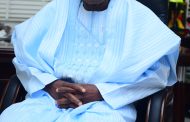Those eager to get a more nuanced insight into the stalemate in Niger Republic have August 17th, 2023 to satisfy that desire. That day will feature a lecturer on the “The Nigerien Crisis: its Development, Interests, Implications, and Pathways to Resolving”

Armed populism in Niger Republic
The lecture is at the instance of the Nigerian Political Science Association (NPSA) which has got Prof Jibrin Ibrahim to speak on the topic. Prof Ibrahim is at advantage in handling the topic in all its complexity because he speaks French, the language of the coloniser and the colonized in this conflict. Speaking French means he can penetrate beyond the referential into the relational meaning of the words by all the key actors in the drama.
A statement from the NPSA Secretariat by Dr. Adebola Bakare, the association’s Secretary-General, called the impending lecture the 12th in the series of their programme tagged ‘the Platform’. The zoom session will take place between 4 – 6pm on the date and anybody can join by clicking on the link (https://unilorin-edu-ng.zoom.us/j/86872640067?pwd=MUhXQklLMnh4WGx1c1luWTBLWkd5dz09)
While potential listeners to the ‘Platform’ await the D-Day, some observers think that presidents, military commanders, diplomats, traditional rulers and intellectuals of statecraft cracking their brain on the stalemate in Niger Republic might do well to reflect on the coup trend with particular reference to whether it might be the return of military vanguardism.
Military vanguardism is the idea that radicals in military uniform can act as a vanguard for socialist revolution.

And in Burkina Faso
The idea of a more holistic understanding of recent democratic reversals especially in Mali, Burkina Faso and Niger amongst others at a time of fluid great power security competition gave rise to the thinking. The question is whether what is happening in those countries can be understood as the return of the phenomenon of military vanguardism.
That question was a subject of a big debate in Nigeria the mid-1980s with well-heeled protagonists and antagonists.
It took Professor Bjorn Beckman, the late Swedish political economist who was teaching Political Science at the Ahmadu Bello University, Zaria to literarily smash the debate by dismissing the idea as the resort of those who were incapable of addressing the difficult task of mobilising the working class, warning that the military in the Third World is a conveyor belt for imperialism.
As long as the debate lasted, it’s protagonists idealised a coup led by a Major proclaiming a socialist strategy. At some point, Major Dangiwa Umar in the Nigerian military fitted into the typecast.
Military vanguardism as a radical academic debate has not been heard any circles in Nigeria since the late 1980s until military officers started returning one after another. Not only are they returning, they are giving seemingly anti-imperialist justification for their return.
Coupists in Africa do appeal to high minded concepts like national security, defence of fatherland, fighting imperialism or fighting corruption only to dig in and outscore those they overthrew for the same reasons.




























